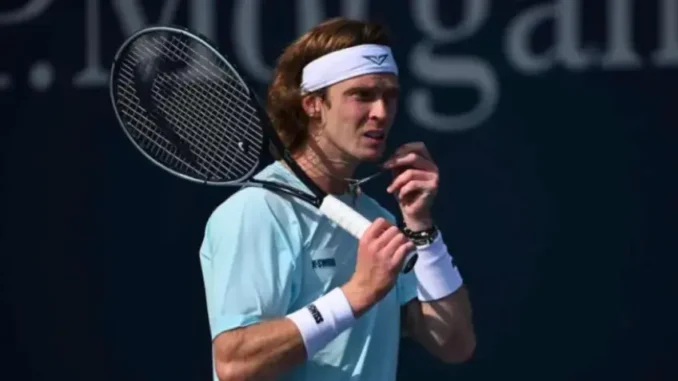
Andrey Rublev, the world-renowned tennis star, has recently offered a candid self-assessment, admitting that he sometimes behaves like a child on the court. This surprising revelation comes amidst a career marked by both exceptional talent and moments of visible frustration, often punctuated by racquet smashing and outbursts. Rublev’s honesty about his on-court demeanor provides a fascinating glimpse into the mind of a top athlete grappling with the intense pressures of professional sport.
Rublev’s journey through the world of professional tennis has been a captivating blend of brilliance and volatility. His powerful groundstrokes and aggressive playing style have propelled him to the top of the game, earning him numerous titles and establishing him as a force to be reckoned with. However, his undeniable talent has often been overshadowed by his emotional outbursts, which have sometimes threatened to derail his progress.
In a recent interview, Rublev addressed the elephant in the room – his on-court behavior. He acknowledged that he can be “childish” at times, a stark contrast to the composure one might expect from a seasoned professional. He didn’t shy away from admitting his struggles with controlling his emotions, painting a picture of an athlete acutely aware of his shortcomings but still striving to overcome them.
“Sometimes I act like a child, yes,” Rublev confessed, according to reports. This admission, while seemingly simple, speaks volumes about his self-awareness. It suggests a willingness to confront his flaws and a desire to improve not just his game, but also his temperament. This kind of introspection is rare and commendable, especially in the high-stakes world of professional sports where the pressure to perform can be immense.
Rublev’s on-court frustrations are often visible. A missed shot, a close line call that goes against him, or a string of unforced errors can trigger a visible shift in his demeanor. Racquets have borne the brunt of his anger, often reduced to mangled pieces of graphite. His outbursts aren’t limited to inanimate objects; he has also been known to direct his frustration towards himself, sometimes muttering angrily or even appearing close to tears.
While these displays of emotion might be perceived negatively by some, they also reveal the depth of Rublev’s passion for the game. He cares deeply about winning, and his frustration stems from the gap between his aspirations and his on-court reality. It’s a raw, unfiltered display of competitive spirit, even if it sometimes manifests in ways that are less than ideal.
Rublev’s honesty about his “childish” behavior suggests a process of self-reflection. He seems to be grappling with the challenge of managing his emotions under pressure, a challenge that many athletes face. The ability to control one’s emotions is a crucial aspect of athletic performance, particularly in individual sports like tennis where the mental game can be just as important as the physical one.
The tennis star’s willingness to admit his flaws could be a sign of growth. By acknowledging his “childish” tendencies, he takes the first step towards addressing them. This kind of self-awareness is essential for any athlete looking to improve, both on and off the court.
It remains to be seen how Rublev’s self-awareness will translate into his on-court performance. Will he be able to channel his passion and intensity in a more constructive way? Will he be able to keep his emotions in check during crucial moments of a match? These are questions that only time will answer.
However, one thing is clear: Rublev’s honesty is refreshing. In a world where athletes are often carefully managed and presented as flawless role models, his candid admission of his struggles is a reminder that even the best in the world are still human. He is a work in progress, just like everyone else, and his journey to master his emotions is a compelling narrative in itself. As he continues to compete at the highest level of the game, many will be watching to see if he can tame his “childish” tendencies and fulfill his immense potential. His journey is a testament to the fact that even at the pinnacle of professional sport, personal growth and development remain a continuous process.
Leave a Reply